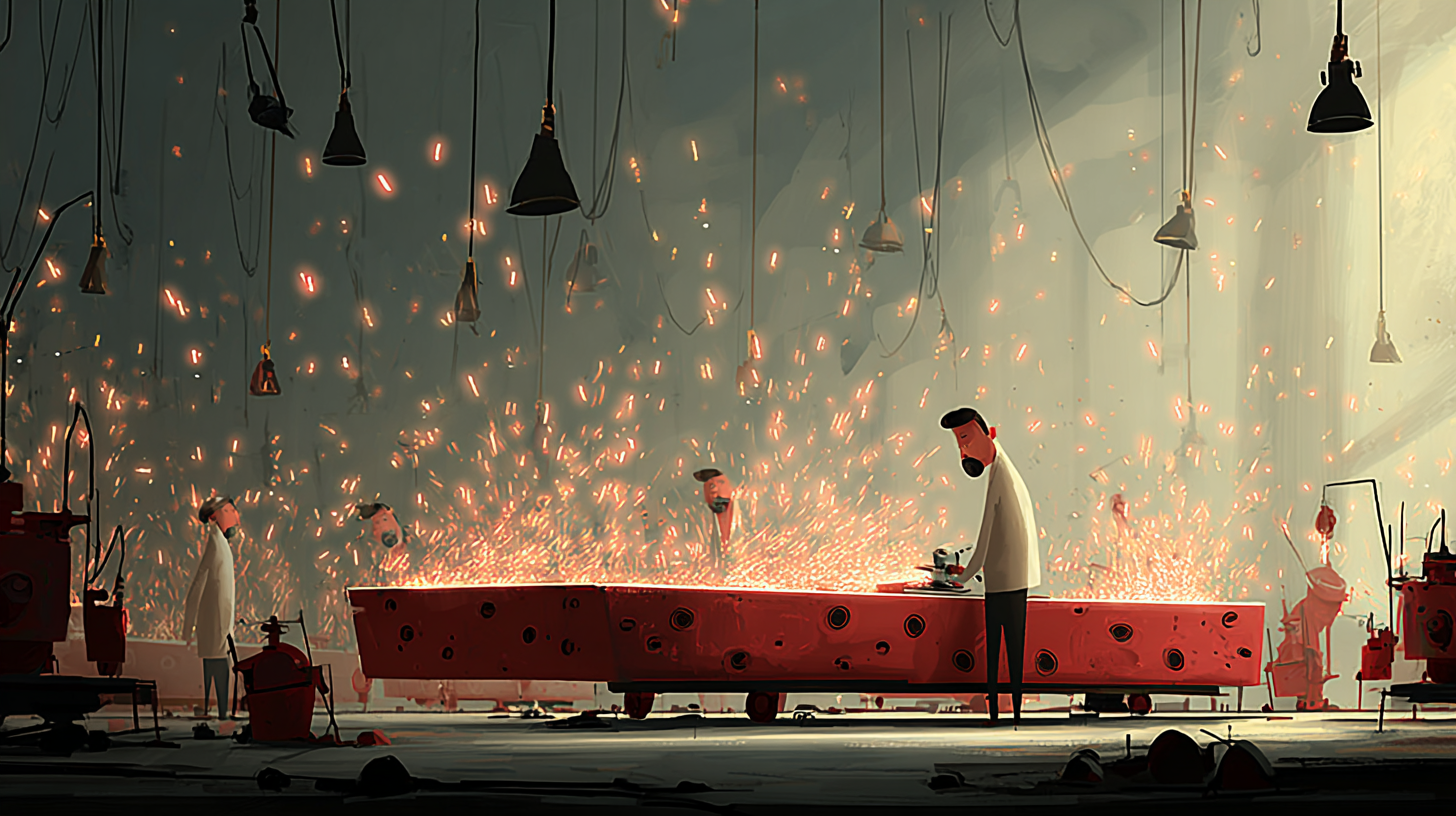Metal means a hard and shiny material like iron or copper.
日本語で一言説明:金属は鉄や銅など、硬くて光る物のこと
以下は英単語 “metal” に関するストーリー型学習コンテンツです。まずは大枠の意味を理解して最後の文章で確認しましょう。
主な意味(main meaning)
| 品詞 | 発音記号 | 意味 | 英語例文 |
|---|---|---|---|
| 名詞 | /ˈmɛt.əl/ | 金属 | The bridge is made of strong metal. |
| 形容詞 | /ˈmɛt.əl/ | 金属の、金属製の | She wore a metal bracelet. |
語源(etymology)
「metal」はラテン語「metallum」(鉱山、鉱物)から来ており、もともとは「地中から掘り出すもの」というイメージ。
類義語(synonyms)
| 類義語 | 意味 | 英語例文 |
|---|---|---|
| steel | 鋼 | The building is supported by steel beams. |
| iron | 鉄 | The gate was made of iron. |
| alloy | 合金 | Bronze is an alloy of copper and tin. |
| copper | 銅 | The wires are made of copper. |
反義語(antonyms)
| 反義語 | 意味 | 英語例文 |
|---|---|---|
| wood | 木材 | The chair is made of wood, not metal. |
| plastic | プラスチック | These bottles are plastic, not metal. |
コロケーション(collocations)
| コロケーション | 英語例文 |
|---|---|
| heavy metal | Heavy metal is a popular style of music. |
| metal detector | They used a metal detector at the airport. |
| metal plate | The table was covered with a metal plate. |
| metal industry | The metal industry is important for the economy. |
2項表現(binomials)
| 2項表現 | 英語例文 |
|---|---|
| metal and wood | The house was built with metal and wood. |
| steel and iron | The company produces steel and iron products. |
英語ストーリー(english story)
Mr. Tanaka worked at a factory in Osaka that produced different types of metal products. Every morning, he walked past a metal detector at the entrance, just like the ones at airports. His company was famous in the metal industry for making high-quality parts for cars and trains.
One day, his manager asked him to design a new product. It had to be strong but not too heavy. Mr. Tanaka thought about different materials. He compared steel and iron, both very strong metals. He also considered copper, which is softer but conducts electricity. After some thought, he decided to use an alloy, a mixture of metals, to get the best balance.
During lunch, he talked with his colleague, Ms. Suzuki.
“Do you think wood could work for this product?” she asked.
Mr. Tanaka shook his head. “No, wood and plastic are not strong enough for this job. We need metal.”
Later, they went to the workshop. The workers were cutting a large metal plate. Sparks flew as machines pressed and shaped the shining surface. Mr. Tanaka admired how hard and shiny the metal looked.
At home that evening, his teenage son was listening to heavy metal music. The loud guitars filled the room. Mr. Tanaka laughed and said, “I work with metal all day, and you listen to it all night!”
The next week, Mr. Tanaka’s team finished the prototype. It was made of steel and iron combined with copper, forming a new strong alloy. The company tested it, and it passed every safety check. His manager praised him, saying, “This is the future of our business.”
Mr. Tanaka felt proud. He realized that even though metal and wood are both important materials, each has its own place in our lives. Metal builds bridges, cars, and trains, while wood builds houses and furniture. Together, they make the world stronger and more beautiful.
和訳
田中さんは大阪の工場で働いていました。その工場はさまざまな**metal(金属)製品を作っていました。毎朝、彼は入口にあるmetal detector(金属探知機)を通って出勤しました。その会社はmetal industry(金属産業)**の中でも、車や電車の高品質な部品を作ることで有名でした。
ある日、上司が彼に新しい製品の設計を頼みました。その製品は強く、しかし重すぎてはいけませんでした。田中さんはいろいろな素材を考えました。彼は**steel(鋼)とiron(鉄)**を比べました。どちらもとても強い金属です。また、**copper(銅)も考えました。これは柔らかいですが電気を通します。考えた結果、彼はalloy(合金)**を使うことにしました。
昼休み、同僚の鈴木さんと話しました。
「木材を使えると思う?」と鈴木さん。
田中さんは首を振りました。「いいえ、**wood(木材)やplastic(プラスチック)**では強度が足りません。金属が必要です。」
その後、二人は作業場に行きました。そこで作業員たちが大きな**metal plate(金属板)**を切っていました。機械が光る表面を押し曲げると火花が飛び散りました。田中さんは、その硬く光る金属に感心しました。
その夜、家に帰ると、息子が**heavy metal(ヘビーメタル音楽)**を聴いていました。大きなギターの音が部屋に響いていました。田中さんは笑って言いました。「私は一日中金属を扱っているのに、君は夜もメタルを聴いているんだな!」
次の週、田中さんのチームは試作品を完成させました。それは**steel and iron(鋼と鉄)**に銅を組み合わせた、新しい強い合金でした。会社はそれをテストし、すべての安全検査に合格しました。上司は彼をほめて言いました。「これが我が社の未来だ。」
田中さんは誇らしく思いました。彼は気づきました。**metal and wood(金属と木材)**はどちらも大切な素材であり、それぞれに役割があります。金属は橋や車や電車を作り、木材は家や家具を作ります。二つがそろって、世界をもっと強く、美しくしているのです。
Q&A
Q: 「metal」と「steel(鋼)」の違いは何ですか?
A: 「metal(金属)」は広い意味で、鉄や銅などすべての金属を指します。「steel(鋼)」はその中の一種で、鉄に炭素を混ぜた合金で、とても強くてさびにくいのが特徴です。
Q: 「metal」と「iron(鉄)」の違いは何ですか?
A: 「metal(金属)」は全体を表す一般的な言葉です。「iron(鉄)」はその中の一つで、身近に使われる金属です。鉄は丈夫ですがさびやすい性質があります。
Q: 「metal」と「alloy(合金)」の違いは何ですか?
A: 「metal(金属)」は純粋な金属そのものを指します。「alloy(合金)」は、2種類以上の金属を混ぜて作った新しい金属のことです。例えば「bronze(青銅)」は銅とすずの合金です。
Q: 「metal」と「copper(銅)」の違いは何ですか?
A: 「metal(金属)」は大きなくくりです。「copper(銅)」はその一種で、電線や硬貨などによく使われる赤っぽい金属です。電気をよく通すのが特徴です。
Q: 「metal」と「wood(木材)」はどう違いますか?
A: 「metal(金属)」は硬くて光る素材で、橋や車などに使われます。「wood(木材)」は木から作られる自然の素材で、家や家具に使われます。性質が大きく違うため、使い分けられます。
Q: 「metal」と「plastic(プラスチック)」はどう違いますか?
A: 「metal(金属)」は自然界から採れる鉱物で、強くて重いです。「plastic(プラスチック)」は石油から作られる人工の素材で、軽くて安く作れるのが特徴です。
Q: 「metal」と「heavy metal(ヘビーメタル音楽)」は関係ありますか?
A: 直接の関係はありません。「metal(金属)」は素材を指し、「heavy metal」は音楽のジャンル名です。強さや重さをイメージして「metal」という言葉が使われています。
Q: 「metal detector(金属探知機)」の「metal」は普通のmetalと同じ意味ですか?
A: はい、同じ意味です。「metal detector」は金属を探知する機械で、空港や工場などで使われます。
Q: 「metal plate(金属板)」の「plate」とは何ですか?
A: 「plate」は「板」という意味です。「metal plate」は「金属でできた平らな板」のことです。
Q: 「metal industry(金属産業)」とは何を指しますか?
A: 「industry」は「産業」の意味です。「metal industry」は「金属を加工したり作ったりする産業」を表します。工場や研究なども含まれます。
Q: 「metal and wood(金属と木材)」のような表現はどういう時に使いますか?
A: 家や家具、建物などで、金属と木材の両方を使っていることを説明するときに使います。
Q: 「steel and iron(鋼と鉄)」という組み合わせはなぜ使われますか?
A: 「steel(鋼)」と「iron(鉄)」は似ていますが、性質が少し違います。そのため、建築や工業で両方を比較したり、一緒に使ったりすることが多いので、組み合わせて表現されます。



コメント